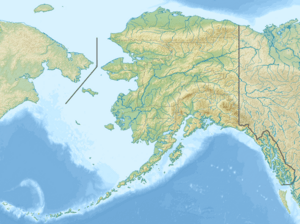Atchuelinguk River facts for kids
Quick facts for kids Atchuelinguk River |
|
|---|---|
|
Location of the mouth of the Atchuelinguk River in Alaska
|
|
| Native name | Ecuilnguq |
| Country | United States |
| State | Alaska |
| Census Area | Kusilvak |
| Physical characteristics | |
| Main source | Nulato Hills Yukon Delta National Wildlife Refuge 2,006 ft (611 m) 63°02′38″N 161°26′38″W / 63.04389°N 161.44389°W |
| River mouth | Yukon River 25 miles (40 km) west of Marshall 0 ft (0 m) 61°57′30″N 162°49′38″W / 61.95833°N 162.82722°W |
| Length | 165 mi (266 km) |
The Atchuelinguk River is an important river located in the state of Alaska, United States. Its name comes from the Yup'ik language, where Ecuilnguq means "clear water." This river is about 165 miles (266 kilometers) long. It flows into the much larger Yukon River.
Contents
Exploring the Atchuelinguk River
The Atchuelinguk River is a long and winding waterway in Alaska. It starts in a hilly area called the Nulato Hills. From there, it flows towards the southwest. The river eventually joins the mighty Yukon River. This meeting point is about 25 miles (40 km) west of a town called Marshall.
Where is the Atchuelinguk River?
This river is found in the Kusilvak Census Area of Alaska. A big part of its journey takes it through the Yukon Delta National Wildlife Refuge. This refuge is a huge protected area. It is home to many different kinds of animals and plants. The river's source, where it begins, is about 2,006 feet (611 meters) high.
What makes the river special?
The Atchuelinguk River is a tributary of the Yukon River. This means it's a smaller river that flows into a bigger one. The Yukon River is one of the longest rivers in North America. The Atchuelinguk River helps to feed the Yukon River with fresh water. Its Yup'ik name, "clear water," suggests that its waters are clean and pure.
Wildlife and Nature
Because the Atchuelinguk River flows through the Yukon Delta National Wildlife Refuge, it's a vital habitat. Many animals depend on this river for survival. You might find different types of fish living in its clear waters. Birds, including many migratory species, also use the river and its surrounding lands. The refuge protects these important natural areas.
 | Audre Lorde |
 | John Berry Meachum |
 | Ferdinand Lee Barnett |


